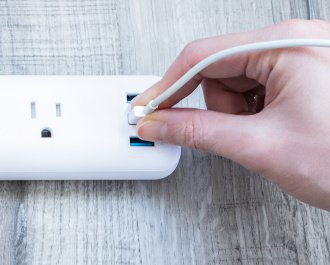
So, how do you shield your precious investments? Protecting your appliances is a bit like wrapping them in a warm, soft blanket during a storm. It takes a few practical steps and the right tools. Don’t worry, I’ll break it all down for you in a way that’s easy to understand, just like chatting with a friend over coffee.
Understanding Power Surges
Let’s start with the basics: what is a power surge? Think of it as a sudden spike in electrical voltage. This can happen for various reasons, such as lightning strikes, faulty wiring, or even when a large appliance—like a refrigerator or air conditioner—turns on. When this surge occurs, it can overwhelm your appliances, leading to some serious damage.
Most appliances are designed to handle a certain amount of power. If they receive too much, it can fry their internal components. For instance, if a surge hits your television, it could result in a burned-out circuit board. That’s not just annoying—it can be pretty costly too. In areas like 90005, where weather conditions fluctuate, being prepared is vital.
Surge Protectors: Your First Line of Defense
A surge protector is like a superhero for your electronics. It’s designed to absorb excess voltage and divert it away from your appliances. Here’s how you can choose the right one:
- Check the Joule Rating: This number tells you how much energy the surge protector can absorb. The higher the number, the better the protection.
- Look for Features: Some models come with additional features like noise filtering or multiple outlets. These can be handy if you have a lot of devices to protect.
- Consider Whole-House Surge Protectors: These can be installed at your electrical panel. They offer comprehensive protection for all the devices in your home.
Using a surge protector is a simple yet effective way to safeguard your appliances. Just remember, surge protectors wear out over time, so it’s a good idea to replace them every few years.
Unplugging During Storms
You might be wondering, “Is unplugging my appliances really necessary?” Honestly, yes. During severe weather, unplugging devices is one of the safest ways to protect them. If you know a storm is coming, consider this your emergency drill:
- Identify Key Appliances: Think about your most important devices—like your refrigerator, computer, and television.
- Make it a Routine: Before a storm, create a checklist so you don’t forget anything. It’s a small step that can save you a lot of hassle later.
- Get Others Involved: If you live with family or roommates, let them know your plan. Teamwork makes the process smoother.
Taking the time to unplug can feel tedious, but it’s worth it. You’ll have peace of mind knowing your devices are safe from a surge that could cause chaos.
Proper Wiring and Electrical Inspection
Have you ever considered the wiring in your home? Old or damaged wiring can be a major contributor to power surges. It’s a good idea to have a professional inspect your electrical system, especially if you’re in an older home or you’ve noticed flickering lights. Here’s why:
- Identify Issues: A licensed electrician can spot problems before they escalate. Cracked insulation, loose connections, or outdated circuits can all lead to surges.
- Upgrade Your System: If your home’s wiring is outdated, upgrading it can protect against surges and improve overall efficiency.
- Check Grounding: Proper grounding helps manage excess voltage. Make sure your electrical system is effectively grounded.
Taking these steps may require an initial investment, but they can save you money in the long run by preventing electrical damage.
Smart Technology for Surge Protection
With technology evolving, there are now smart appliances that come equipped with built-in surge protection. These devices can detect power fluctuations and automatically adjust their settings to protect against damage. Here’s what you should keep in mind:
- Look for Smart Features: When shopping for new appliances, check for features like voltage regulation and surge protection capabilities.
- Connect to Your Wi-Fi: Some smart appliances can send alerts to your phone if they detect electrical issues, allowing you to respond quickly.
- Don’t Forget About Older Appliances: If your older devices lack these features, consider using external surge protectors alongside them.
Investing in smart technology not only adds convenience to your life but also enhances the longevity of your appliances.
Regular Maintenance and Care
Just like any other part of your home, appliances need regular care to function well over time. Here are some maintenance tips to help you protect them:
- Clean Vents and Filters: For devices like air conditioners and dryers, keeping vents and filters clean helps them operate efficiently.
- Keep an Eye on Cords: Regularly check power cords for frays or signs of wear. If you spot something suspicious, replace them right away.
- Schedule Routine Inspections: Having a technician look over your appliances can catch minor issues before they turn into major problems.
A little TLC can go a long way in extending the life of your appliances and keeping them safe from surges.
Power surges might seem like an invisible foe, but with the right knowledge and tools, you can protect your appliances effectively. By using surge protectors, unplugging during storms, maintaining your wiring, and considering smart technology, you can shield your appliances from damage.
In the end, investing a little time and effort now will save you in the long run. Just like wrapping your favorite sweater before heading out in cold weather, taking these steps means you’re prepared for whatever nature throws your way. So go ahead, take charge of protecting your home and appliances in zip code 90005—your gadgets will thank you later!